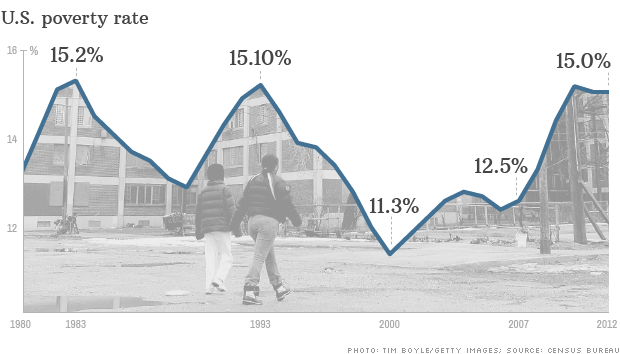Years after the Great Recession ended, 46.5 million Americans are still living in poverty, according to a Census Bureau report released Tuesday.
On September 17, 2013, Steve Hargreaves writes on CNN Money:
Meanwhile, median household income fell slightly to $51,017 a year in 2012, down from $51,100 in 2011 — a change the Census Bureau does not consider statistically significant.
But taking a wider view reveals a larger problem: Income has tumbled since the recession hit, and is still 8.3% below where it was in 2007.
“We’ve had [economic] growth, but it hasn’t really reached everyday Americans,” said Elise Gould, an economist at the left-leaning Economic Policy Institute. “It’s a lost decade, maybe more.”
This long-term decline in income is troubling to economists, especially as the middle and lower classes have fared considerably worse than the rich. Since 1967, Americans right in the middle of the income curve have seen their earnings rise 19%, while those in the top 5% have seen a 67% gain. Rising inequality is seldom a sign of good social stability.
Americans were the richest in 1999, when median household income was $56,080, adjusted for inflation.
How the poorest are faring: The recession also pushed many more people into poverty. In 2010, the poverty rate peaked at 15.1%, and has barely fallen since then. This is the first time the poverty rate has remained at or above 15% three years running since 1965.
Those making $23,492 a year for a family of four, or $11,720 for an individual were considered to be living in poverty.
This difference or inequality between those that are prospering and those that are not is a matter of OWNING productive capital assets versus NOT OWNING and solely dependent on a job for income. As tectonic shifts in the technologies of production will continue to transpire, jobs will further be destroyed (which increases the number of people seeking employment) and the worth of labor devalued, as well as by globalization, which shifts employment to other countries where labor is less costly as well as regulations and controls.
Conventional economists continue to confuse the incomes that the wealthy rich class earn with the incomes earned from labor. What needs to be STRESSED is that the reason the rich are rich is because their earnings are generated by their ownership of wealth-creating, income-generating productive capital assets––not a job! Labor workers ONLY have a job (and increasingly less opportunity for good-paying jobs) as their source of income. And if they are creditworthy they will have managed to finance and pay for the purchase of a primary residence, which at the end of 30 or so years is the asset of their lifetime. But they dare not sell this asset (because they always need a roof over their heads) unless they can re-purchase another residence that meets their housing needs at less cost and benefit financially from a capital gain earning. But most Americans never even achieve this small degree of financial security and continuously live financially insecure their entire life.
This deplorable situation will worsen as long as we as a nation fails to address the REAL problem at the root of income inequality and poverty––CONCENTRATED OWNERSHIP of wealth-creating, income-generating productive capital. And to advocate for solutions that systematically broaden private sector individual ownership of the formation of FUTURE productive capital investment to empower EVERY American to accumulate over time a viable capital trust (super-IRA) portfolio of stock in diversified companies and reap the full earnings payout of corporate earnings as dividend income to support their livelihood and retirement. Such economic policy will build REAL financial security and wealth assets that generate annual incomes.
What is needed is leadership and government policies that result in the enrichment of EVERY citizen, not just those who already OWN America. How to achieve this solution is outlined in “Financing Economic Growth With ‘FUTURE SAVINGS’: Solutions To Protect America From Economic Decline” at NationOfChange.org http://www.nationofchange.org/financing-future-economic-growth-future-savings-solutions-protect-america-economic-decline-137450624 and “The Income Solution To Slow Private Sector Job Growth” at http://www.nationofchange.org/income-solution-slow-private-sector-job-growth-1378041490.


